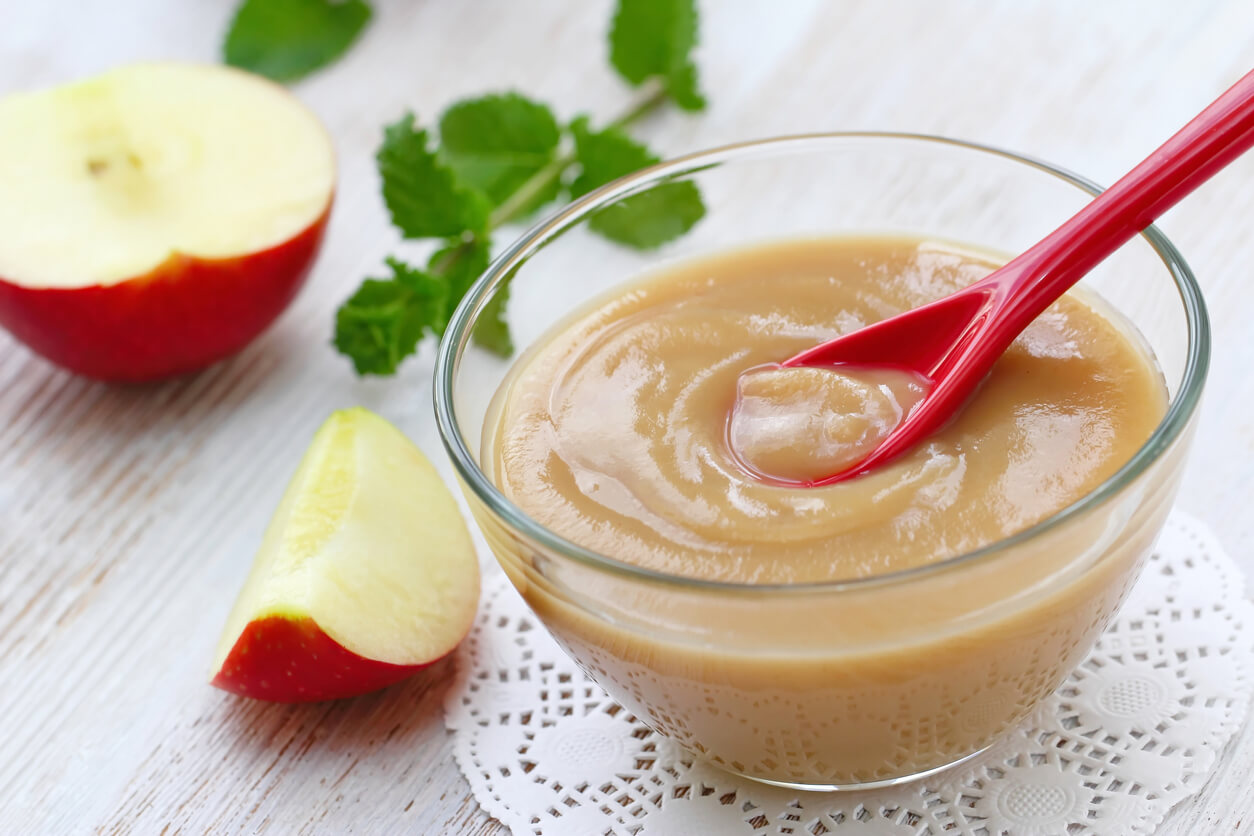Apple Sauce for Babies: Recipe and Benefits

Apple sauce for babies is a very beneficial preparation to include in the diet of little ones. It manages to provide a good amount of essential nutrients, in addition to soluble fiber. In addition, it can be introduced into the complementary diet early and thus increase the energy intake that maintains the balance of the internal environment.
Keep in mind that up to 6 months of life, breast milk must be the exclusive food. From then on, the spectrum of foods can be increased, but breastfeeding should be maintained at least until the first year of life.
Are you ready to get started? Let’s begin!
The ingredients for apple sauce for babies
To prepare an exquisite apple sauce for babies, the following ingredients will be necessary:
- 2 apple
- 2 tablespoons of water
It’s important to choose the apple correctly, as not all have the same degree of sweetness or the same texture.
At first, it may be that the sweetest alternatives (such as the red varieties) achieve greater acceptance, but it’s worth choosing those that are in season. This favors the intake of essential micronutrients for each season of the year.

Step-by-step instructions
First of all, the apple must be washed and disinfected. Next, cut it into small pieces and place them in a pan. Cover the fruit with water and cook over low heat until it reaches a tender texture.
Once this step is over, place the preparation in the pitcher of a blender and blend with a little of the cooking water until you get a homogeneous sauce. When this has cooled down a bit, you can serve it.
This preparation can also be offered to older children and even adults. In any case, it’s considered beneficial. Moreover, when consumed at a different stage of life than early childhood, cinnamon can be added to enhance its benefits.
The benefits of apple puree
The inclusion of applesauce in the context of complementary feeding can bring a number of benefits to children’s health.
First of all, we’re talking about a product that stands out for its concentration of soluble fiber. This element ferments inside the digestive tract and allows the bacteria that make up the microbiota to use it as fuel. This is evidenced by research published in Current Allergy and Asthma Reports.
It’s essential to take care of the composition of the microorganisms that inhabit the intestine, as otherwise, the risk of future inflammatory diseases could be increased. Some of these diseases condition the absorption and digestion of nutrients, which produce nutritional deficiencies that worsen the problem.
At the same time, apples also provide a significant amount of antioxidant compounds. These elements neutralize the formation of free radicals and their subsequent accumulation in the body’s tissues. This mechanism is related to a lower incidence of many complex diseases, according to a study published in the European Journal of Medicinal Chemistry.
It’s important to note that the intake of plant-based foods must be varied. Although all these foods have phytochemicals, their characteristics can vary depending on the product. The greater the spectrum of vegetables consumed, the lower the risk of oxidation affecting health over the years.

Make apple sauce for babies
As you have seen, preparing apple sauce for babies is really simple. Only two ingredients are necessary and, in just a few minutes, you’ll achieve a fantastic result with a high level of acceptance.
One important fact is that it’s advisable to avoid adding sugar, which many people do to get children to eat the sauce. This ingredient is unnecessary, habit-forming, and can be harmful when consumed regularly.
To finish, remember that planning an adequate diet from the first stages of life will mark the future state of health. It’s essential to avoid deficiencies of essential micronutrients because this could negatively affect the functioning of the organism. And consequently, chronic and complex diseases appear over the years.
Apple sauce for babies is a very beneficial preparation to include in the diet of little ones. It manages to provide a good amount of essential nutrients, in addition to soluble fiber. In addition, it can be introduced into the complementary diet early and thus increase the energy intake that maintains the balance of the internal environment.
Keep in mind that up to 6 months of life, breast milk must be the exclusive food. From then on, the spectrum of foods can be increased, but breastfeeding should be maintained at least until the first year of life.
Are you ready to get started? Let’s begin!
The ingredients for apple sauce for babies
To prepare an exquisite apple sauce for babies, the following ingredients will be necessary:
- 2 apple
- 2 tablespoons of water
It’s important to choose the apple correctly, as not all have the same degree of sweetness or the same texture.
At first, it may be that the sweetest alternatives (such as the red varieties) achieve greater acceptance, but it’s worth choosing those that are in season. This favors the intake of essential micronutrients for each season of the year.

Step-by-step instructions
First of all, the apple must be washed and disinfected. Next, cut it into small pieces and place them in a pan. Cover the fruit with water and cook over low heat until it reaches a tender texture.
Once this step is over, place the preparation in the pitcher of a blender and blend with a little of the cooking water until you get a homogeneous sauce. When this has cooled down a bit, you can serve it.
This preparation can also be offered to older children and even adults. In any case, it’s considered beneficial. Moreover, when consumed at a different stage of life than early childhood, cinnamon can be added to enhance its benefits.
The benefits of apple puree
The inclusion of applesauce in the context of complementary feeding can bring a number of benefits to children’s health.
First of all, we’re talking about a product that stands out for its concentration of soluble fiber. This element ferments inside the digestive tract and allows the bacteria that make up the microbiota to use it as fuel. This is evidenced by research published in Current Allergy and Asthma Reports.
It’s essential to take care of the composition of the microorganisms that inhabit the intestine, as otherwise, the risk of future inflammatory diseases could be increased. Some of these diseases condition the absorption and digestion of nutrients, which produce nutritional deficiencies that worsen the problem.
At the same time, apples also provide a significant amount of antioxidant compounds. These elements neutralize the formation of free radicals and their subsequent accumulation in the body’s tissues. This mechanism is related to a lower incidence of many complex diseases, according to a study published in the European Journal of Medicinal Chemistry.
It’s important to note that the intake of plant-based foods must be varied. Although all these foods have phytochemicals, their characteristics can vary depending on the product. The greater the spectrum of vegetables consumed, the lower the risk of oxidation affecting health over the years.

Make apple sauce for babies
As you have seen, preparing apple sauce for babies is really simple. Only two ingredients are necessary and, in just a few minutes, you’ll achieve a fantastic result with a high level of acceptance.
One important fact is that it’s advisable to avoid adding sugar, which many people do to get children to eat the sauce. This ingredient is unnecessary, habit-forming, and can be harmful when consumed regularly.
To finish, remember that planning an adequate diet from the first stages of life will mark the future state of health. It’s essential to avoid deficiencies of essential micronutrients because this could negatively affect the functioning of the organism. And consequently, chronic and complex diseases appear over the years.
All cited sources were thoroughly reviewed by our team to ensure their quality, reliability, currency, and validity. The bibliography of this article was considered reliable and of academic or scientific accuracy.
- Blanco-Pérez, F., Steigerwald, H., Schülke, S., Vieths, S., Toda, M., & Scheurer, S. (2021). The Dietary Fiber Pectin: Health Benefits and Potential for the Treatment of Allergies by Modulation of Gut Microbiota. Current allergy and asthma reports, 21(10), 43. Disponible en: https://doi.org/10.1007/s11882-021-01020-z
- Neha, K., Haider, M. R., Pathak, A., & Yar, M. S. (2019). Medicinal prospects of antioxidants: A review. European journal of medicinal chemistry, 178, 687–704. Disponible en: https://doi.org/10.1016/j.ejmech.2019.06.010
This text is provided for informational purposes only and does not replace consultation with a professional. If in doubt, consult your specialist.








